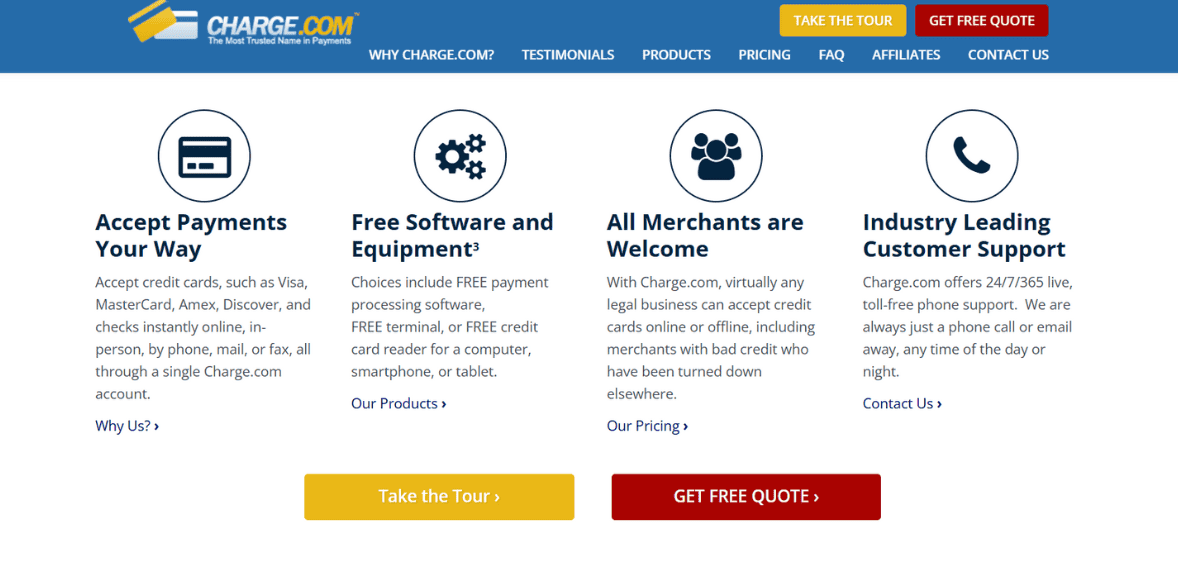Charge.com Review

Charge.com has been a merchant services provider for nearly three decades. Founded in 1995, the company bills itself as a simple and affordable payment solution for businesses of all sizes. It offers in-person, online and mobile transactions to give merchants cost effective tools without big upfront investments. Over the years Charge.com has gotten attention for its low advertised rates and easy setup but has also gotten flak for hidden fees, outdated systems and mixed customer support. Lets read more about Charge.com Review.
Company Background | Charge.com Review
Charge.com entered the payment processing industry in the mid 1990s when small businesses were struggling to get affordable merchant accounts. The company’s initial strategy was to fill that gap by offering simple and inexpensive solutions that would allow entrepreneurs to accept credit cards without going through banks’ restrictive and expensive merchant programs. This gave Charge.com an early advantage especially among small businesses that needed low barriers to entry.
Through mergers and acquisitions Charge.com’s corporate structure has changed several times. It was acquired by Pipeline Data, then merged with Cynergy Data and eventually absorbed into Priority Payment Systems. These changes have given the company access to stronger financial backing and corporate oversight but also raises questions about consistency of service. Some merchants see the corporate backing as a stabilizing force while others worry about the complexity that comes with multiple ownership changes.
Despite being around for nearly thirty years, Charge.com’s online presence has not kept up with modern competitors. Its branding, website and user portal looks outdated which may give prospective merchants the impression that the company is behind the times. But for many cost conscious businesses branding is less important than reliability and affordability. Charge.com’s ability to stay relevant for almost thirty years is a testament to its ability to adapt as the payment industry gets more competitive and innovative.
Services Offered
Charge.com markets itself as a provider of versatile merchant services capable of serving both small operations and growing enterprises. Its offerings span key areas of payment acceptance and security.
Merchant Accounts and Processing Solutions
The cornerstone of Charge.com’s services lies in its ability to process credit and debit card payments. Merchants can accept transactions from Visa, Mastercard, American Express, and Discover, ensuring compatibility with the most widely used card brands. Additionally, the company supports electronic checks, which broadens its utility for businesses that serve customers who prefer direct bank payments. The ability to process high transaction volumes efficiently makes Charge.com a fit for both small and medium-sized merchants with steady sales activity.
Online Payment Gateways
Charge.com provides a secure payment gateway for businesses running e-commerce operations. This gateway allows website owners to embed checkout functionality directly into their sites through hosted forms or shopping cart integrations. While these features may seem basic compared to modern gateways with advanced customization, they remain useful for businesses that want a dependable way to handle online sales. Charge.com also emphasizes customization, giving merchants the flexibility to align the checkout page with their brand identity, which is essential for maintaining consumer trust.
Mobile Payment Options
Mobile solutions have become increasingly vital in an economy that favors flexibility. Charge.com offers mobile payment processing through smartphones and tablets, allowing merchants to accept payments on the go. This feature is particularly relevant for food trucks, trade show vendors, service professionals, and temporary pop-up shops. The mobile app includes features such as issuing digital receipts and tracking inventory, making it more than just a card-swiping tool. By providing this service, Charge.com positions itself as a partner for entrepreneurs who operate outside traditional storefronts.
Virtual Terminals and Recurring Billing
The virtual terminal is another useful feature, enabling merchants to process payments manually by entering customer card details through a secure online portal. For businesses that accept orders over the phone or by mail, this functionality is particularly valuable. Charge.com also supports recurring billing, an increasingly important feature for subscription-based businesses such as gyms, online services, and membership organizations. Its recurring billing tools allow merchants to automatically charge customers at set intervals, reducing administrative effort and improving cash flow reliability.
POS Solutions
For brick-and-mortar businesses, Charge.com provides POS systems. These include card readers and compatible software that allow retailers to process payments in physical stores. The POS systems integrate with basic inventory management, though they are not as advanced as systems offered by specialized providers. For businesses that need comprehensive retail management tools with analytics and hardware variety, Charge.com’s solutions may feel limited. However, for merchants who only require essential POS functionality, these systems remain useful and budget-friendly.
Payment Security Features
Charge.com emphasizes security across its services. Fraud-prevention tools include tokenization, encryption, AVS, and CVV checks. These measures protect sensitive data and reduce the risk of fraudulent transactions. By maintaining compliance with industry standards, Charge.com ensures that businesses meet the requirements necessary to handle cardholder information responsibly.
Industry-Specific Solutions
The company adapts its services for various industries, including retail, hospitality, and e-commerce. For example, high-volume retailers benefit from its scalable processing systems, while subscription-based businesses gain from recurring billing options. This tailored approach helps Charge.com remain competitive by demonstrating that its solutions are not one-size-fits-all but adaptable to sector-specific needs.

Pricing and Fees
Charge.com advertises itself as a low-cost option, but a closer look reveals complexities that businesses should evaluate carefully.
Breakdown of Costs
The company promotes transaction rates as low as 0.25%. However, this rate usually applies only to qualified transactions that meet certain requirements, such as being swiped in person with a standard consumer credit card. Non-qualified transactions; such as those keyed in manually, made with rewards cards, or processed online; may incur higher fees. Additional costs, such as monthly statement fees, gateway access charges, and PCI compliance fees, can increase the overall expense for merchants.
Hidden Fees and Transparency Issues
Some merchants have reported surprise fees, including setup costs, early termination penalties, or additional surcharges for specific transaction types. While Charge.com emphasizes transparency, these reports suggest that the clarity of its contracts may not always meet expectations. Businesses should carefully review terms and ask direct questions during the sales process to avoid unexpected expenses.
Comparison with Competitors
Against competitors like Square and PayPal, Charge.com’s model can be more attractive for high-volume merchants who benefit from low per-transaction rates. However, small businesses with inconsistent or seasonal sales may find the monthly charges disadvantageous. In such cases, providers that charge only per transaction without monthly fees may present a better deal. The choice largely depends on a business’s sales volume and transaction patterns.
Integration and Compatibility
Charge.com has integrations with various platforms and systems so it’s pretty flexible for different business models. It’s compatible with major e-commerce platforms like Shopify, WooCommerce and Magento so online retailers can embed payment solutions into their stores without much hassle. Charge.com also has APIs that developers can use to create custom integrations. While the APIs work, the documentation is not as comprehensive as the bigger competitors. Improving their developer resources could help them attract more tech-savvy businesses.
On the hardware side, Charge.com supports standard card readers and traditional terminals. This means businesses don’t have to upgrade their hardware. But it also means they don’t have advanced or specialized hardware options for merchants who want modern POS features like contactless payments, integrated loyalty programs or advanced analytics.
User Experience
User experience is important for payment processing platforms and Charge.com’s is a mixed bag. The account setup process is straightforward, application and approval process is quick and sales reps often provide direct onboarding support so merchants can start accepting payments right away. But businesses that want a self-service onboarding process might find Charge.com less efficient than competitors that offer fully digital signups.
The website and merchant portal is functional but outdated. Many modern payment processors emphasize sleek dashboards, intuitive navigation and visually appealing designs. Charge.com’s older design might deter businesses that value a nice user experience.
Customer support is 24/7 via phone and email. While the 24/7 availability is a big plus, feedback is inconsistent. Some users say responsive and knowledgeable support while others report delays or limited help. Adding live chat and comprehensive online resources could make a big difference in the support experience.
Pros and Cons
Charge.com’s appeal lies in its affordability and versatility, but merchants must also weigh its drawbacks.
Pros include:
Attractive rates for high-volume merchants
Support for multiple payment methods, including e-checks
Range of options across online, mobile, and in-store payments
24/7 customer support availability
Cons include:
Hidden or unclear fees in certain cases
Outdated design and branding
Limited advanced hardware options
Mixed reviews about support responsiveness
Security and Compliance
Charge.com takes payment security seriously, offering features that safeguard customer data and maintain compliance. The company adheres to PCI DSS standards, ensuring sensitive information is encrypted and securely transmitted. Fraud prevention measures include AVS checks, CVV verification, and chargeback support. Although effective, these tools are basic compared to more advanced systems offered by specialized fraud-prevention providers. Encryption is applied end-to-end, reducing the risk of interception during transactions. This focus on data security gives merchants confidence that their customers’ information is being handled responsibly.
Customer Feedback
Customer reviews of Charge.com reflect a blend of satisfaction and criticism. On the positive side, merchants appreciate the affordability and flexibility of its payment options. Many cite the ability to accept diverse payment methods, including e-checks, as a major advantage.
On the negative side, merchants often complain about hidden fees, outdated user interfaces, and inconsistent customer support. These recurring themes indicate areas where Charge.com could significantly improve its reputation. Transparency and investment in modern technology would go a long way in addressing these concerns.

Contract Terms and Policies
Charge.com typically requires merchants to commit to contracts lasting one to three years. These contracts often include automatic renewal clauses, which can catch businesses off guard if they are not aware of the terms. Early termination fees are a common frustration, sometimes running into hundreds of dollars. Businesses that attempt to switch providers before the contract ends may find themselves facing steep penalties. This highlights the need for merchants to carefully review all contract details, including cancellation policies, before signing an agreement.
Scalability for Growing Businesses
Charge.com has the infrastructure to support businesses that scale, offering high-volume transaction processing and integration with enterprise-level tools. This makes it a potentially viable option for companies planning to expand operations.
However, its limited reporting and analytics tools may hinder growing businesses that rely on data-driven decision-making. While basic reports provide visibility into sales and transactions, the lack of advanced analytics means businesses may need to invest in third-party solutions to gain deeper insights. Expanding its reporting capabilities would make Charge.com more competitive for scaling enterprises.
Reporting and Analytics
Reporting is a critical component for businesses monitoring financial performance. Charge.com provides fundamental tools that allow merchants to view sales summaries, transaction histories, and account activity. These reports are functional but not advanced.
For example, merchants looking for customer behavior insights, predictive analytics, or customizable dashboards may find Charge.com lacking. Competitors increasingly provide such features as standard, which highlights an area where Charge.com could enhance its value proposition. While the existing tools suffice for basic tracking, data-driven companies will likely need to supplement them with external analytics software.
Chargeback Management
Chargebacks can be costly and disruptive, so businesses need robust management tools. Charge.com offers fraud prevention measures, automated alerts for disputes, and support for responding to chargeback claims. These tools help merchants build a defense against chargebacks but are not as comprehensive as the solutions provided by specialized providers.
Merchants handling high volumes of transactions, especially in industries prone to disputes, may find Charge.com’s chargeback management insufficient for their needs. While it provides a basic framework, businesses that require detailed chargeback analytics or dedicated prevention programs may need to look elsewhere.
Customer Support Accessibility
Charge.com emphasizes accessibility by providing 24/7 support via phone and email. This is a major benefit for businesses that operate outside standard business hours or encounter urgent issues. However, the absence of live chat and a limited online knowledge base reduces convenience for users who prefer immediate, self-service solutions. Competitors are increasingly adopting these support channels to improve resolution times and empower customers. Expanding support resources could greatly improve the overall customer experience.
Final Verdict
Charge.com has remained a reliable presence in the merchant services industry for nearly three decades, largely due to its affordability and comprehensive basic services. It is a strong option for businesses seeking straightforward payment processing without unnecessary extras. However, its drawbacks; including outdated branding, inconsistent support, and hidden fees; make it less attractive for merchants who prioritize transparency and advanced technology. For small businesses focused primarily on low-cost solutions, Charge.com remains a viable option. But for enterprises or tech-driven companies, newer competitors may offer more sophisticated features and a better overall experience.
FAQs
Is Charge.com suitable for small businesses?
Yes. Its affordable pricing and variety of payment options make it a good choice for small businesses, though contract terms should be reviewed carefully to avoid surprises.
Does Charge.com require long-term contracts?
Yes. Most agreements span one to three years and may include early termination penalties. Merchants are advised to clarify terms before committing.
What industries does Charge.com serve?
Charge.com supports a wide range of industries, including retail, hospitality, e-commerce, and service-based businesses, tailoring its solutions to sector-specific requirements.





